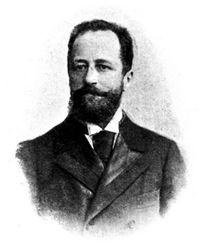Top Qs
Timeline
Chat
Perspective
Wilhelm Filehne
German pharmacologist (1844–1927) From Wikipedia, the free encyclopedia
Remove ads
Wilhelm Filehne (12 February 1844, in Posen – 29 April 1927, in Bensheim) was a German pharmacologist, who specialized in research of antipyretic drugs.[1]

Wilhelm Filehne
He studied medicine at the universities of Heidelberg and Berlin, where his instructors included Emil du Bois-Reymond and Friedrich Theodor von Frerichs. In 1866 he received his doctorate, and afterwards, he worked as assistant under Rudolf Virchow in Berlin. After participation in the Franco-Prussian War, he returned to Berlin as an assistant to Ludwig Traube.[2] In 1874 he relocated to the University of Erlangen, where he worked as an assistant under Wilhelm Olivier Leube at the medical polyclinic.[3]
In 1876 he became an associate professor of pharmacology at Erlangen, and ten years later, was appointed a full professor of the same subject at the University of Breslau.[3] In 1911 he was succeeded at Breslau by Julius Pohl.[4]
In addition to work in the field of pharmacology, he made contributions in his research of optical illusions, being known for his experimentation with a phenomenon known as a Zöllner illusion.[5] The so-called "Filehne illusion" is the illusory motion of a stationary background when smooth pursuit eye movements are made across the stationary background.[6][7]
Remove ads
Selected works
- Ueber die einwirkung des morphins auf die athmung, 1879 – On the effect of morphine on respiration.
- Ueber das Antipyrin, ein neues Antipyreticum, 1884 – On antipyrine, a new antipyretic.[8]
- Lehrbuch der Arzneimittellehre und Arzneiverordnungslehre, 1887 – Textbook of pharmacology.[9]
- Ueber das Pyramidon, ein Antipyrinderivat, 1896 – On Pyramidon, an antipyrine derivative.[10]
References
Wikiwand - on
Seamless Wikipedia browsing. On steroids.
Remove ads
